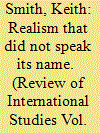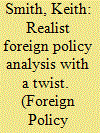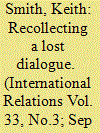| Srl | Item |
| 1 |
ID:
153258


|
|
|
|
|
| Summary/Abstract |
E. H. Carr was one of Europe’s pre-eminent thinkers in the field of international affairs. Yet his contribution to International Relations theory is continually questioned. Realists depict Carr as a quintessential realist; revisionists draw from his wider corpus to qualify his contribution. Although not inaccurate, the revisionist literature is incomplete as it neglects a number of Carr’s diplomatic histories. Refocusing on these, especially the manner in which traces of Ranke’s ‘the primacy of foreign affairs’ tradition is evident, this article points to a more conservative and less critical Carr. Utilising an interpretivist framework, this shift in traditions of thought is explained by the dilemmas Carr faced. Although works of history rather than theory, the article contends that Carr’s diplomatic histories remain relevant, particularly with regard to the embedded criticism of realpolitik they contain. This realisation is made evident through a reading of Carr in parallel with the concept of tragedy.
|
|
|
|
|
|
|
|
|
|
|
|
|
|
|
|
| 2 |
ID:
146342


|
|
|
|
|
| Summary/Abstract |
Analyses of US post-Cold War foreign policy in the Persian Gulf symbolize realism's new found concern with foreign policy analysis. Prominent realists attribute specific policies to domestic concerns and how they have dominated policymaking in the era of US primacy. Although convincing, this perspective is not comprehensive. By drawing on regional security complex theory, it is possible to map the regional developments that have equally constrained and incentivized the rise and fall of dual containment. This more extensive account produces two important findings regarding realism's neglect of the regional level of analysis. First, realists overstate the domestic determinants of US policy in the Persian Gulf. Second, and more broadly, realist foreign policy analysts underspecify systemic pressures that shape and shove a country's foreign policy.
|
|
|
|
|
|
|
|
|
|
|
|
|
|
|
|
| 3 |
ID:
168501


|
|
|
|
|
| Summary/Abstract |
Since its appellation, much work has sought to consolidate neoclassical realism. Specifically, a number of variations on the neoclassical theme have reconceptualised the third-image and carved out a distinctly European neoclassical variant. This article contributes by recollecting the Structural Realism of Logic of Anarchy. In unpacking Structural Realism’s framework and dissecting its engagement with inter alia Kenneth Waltz, this article illustrates the importance of Logic’s conceptualisation of the system, particularly in terms of anarchy’s logic. This framework can enrich a number of debates within the neoclassical realist community, especially concerning third-image change and the possibility of a neoclassical realism in and of Europe, while also contributing to debates regarding the strategic actor-ness of the European Union. While Logic and its framework might appear dated, the article submits that one of its principal motifs, anarchy, along with realism’s normative ethos may remind us of International Relation’s (IR’s) healthy pluralism.
|
|
|
|
|
|
|
|
|
|
|
|
|
|
|
|